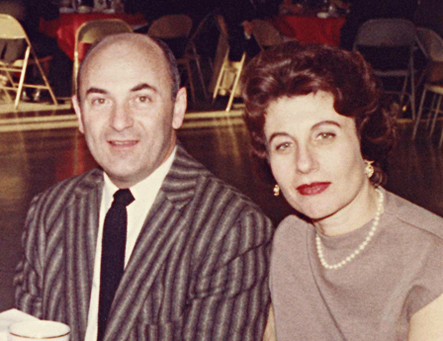

Reviews of Recent Independent, Foreign, & Documentary Films in Theaters and DVD/Home Video
Directed & Photographed by: Doug Block. Produced by: Block & Lori Cheatle. Written by: Block & Amy Seplin. Edited by: Seplin. Music: H. Scott Salinas. Released by: Truly Indie. Country of Origin: USA. 88 min. Not Rated. Doug Block’s documentary is a nonfiction link between the families in The Best Years of Our Lives and The Boynton Beach Club, from World War II veterans moving to the suburbs to bereavement and Florida retirement, but this time from one son’s point of view from the inside out. The first third is a straightforward narrative tapestry, weaving together Block’s footage of his stoic father’s 65th birthday in 1985 and, more extensively, of his parents’ 50th anniversary in 1997 with faded photographs, slides, home movies and ghostly clips of interviews with his articulate older sisters and voluble mother. The second third somewhat petulantly covers the shock of adult children discovering their parents are mortal. Their mother suddenly dies in 2002, and a few months later, their father starts a new life – with a woman from his past. The son tries to reconcile his feelings of loss with his father’s palpable and seemingly uncharacteristic joy. Mournfully hiding behind his camera, Block witnesses the dismantling of their lives at the titular address in Long Island, NY as, room by room, the family goes through the accumulations of a lifetime. His dad, Mike, cheerfully urges him to take worn items, and the twinkling new wife energetically throws out as much as she can as she and Mike prepare their move to Florida. And then there’s the psychological equivalent of an Antiques Roadshow discovery that raises the film to a level usually only explored through fiction and Hollywood biopics: decades of his mother’s diaries, revealing her inner life for the first time to the children who always loved her best – but only if they can face reading them. While what follows has the prurient appeal of a reality TV show, like a retrospective reconstruction of the Loud family of 1973’s An American Family series, Block goes beyond family memorabilia by taking a wider perspective on marriage as a marathon. Though he has directed and produced several documentaries, his day job is a wedding videographer, and he ironically intercuts a variety of those eternally optimistic occasions. In addition, he interviews two outside experts, Dr. Samuel Osherson, psychologist and author of Finding Our Fathers: How a Man's Life Is Shaped by His Relationship with His Father, and Rabbi Jonathan Blake, who was enlisted after Block was impressed by his officiating at a wedding. The young clergyman brings surprisingly sage experience from listening to eulogies to the past, as well as toasts to the future, in presiding over as many funerals as weddings. While providing a non-nostalgic antidote to the praises of the Greatest Generation, Block amusingly reinforces the continuing narcissism and lingering idealism of baby boomers. He gloats a bit about his long term, non-suburban marriage in an unlikely pairing (barely mentioning his own daughter) and doesn’t seem to have read Betty Friedan’s 1963 classic The Feminine Mystique or the plethora of examinations of suburbia. (His sisters sympathize with their parents’ social roles, but he films his siblings in uncomfortably intense close-ups.) Block struggles to see his parents as people caught up in larger cultural trends, from ‘50’s faith in paternalistic psychotherapy to ‘60’s experimentation to ‘70’s swinging. Assuming that the current acceptability of divorce is always the reasonable answer for a strained relationship, he has evidently not learned from watching the Clintons that no one can ever really understand someone else’s long marriage.
Another of his blithe presumptions is that he and his two sisters should know their parents the best. This is clearly not so once he briefly interviews his mother’s brother and her best friend, Natasha, who obviously understand more about his parents as a couple and as individuals. Block grapples very slowly in figuring out how and what to ask them, a key skill for any oral historian and amateur family genealogist who would be inspired by this film to go beyond updating the family tree. It is only after he has pored through his mother’s writings, with selected words blown up on the screen, does he recognize that she was frank with him on film, but he just wasn’t listening and didn’t understand her. And then he’s finally ready to really talk to his father. As this is definitely not a date movie or for a family outing, you would be advised to see this accompanied by someone with whom you can kvetch afterwards about your own family.
Nora Lee Mandel
|